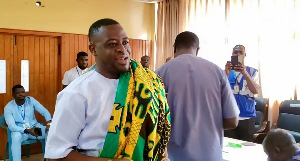Bolgatanga, June 30, GNA - Some 61.1 per cent of schools in 60 districts in the Greater Accra, Northern, Upper East and Upper West regions still charge school fees, according to a survey conducted by SEND Ghana, a non-governmental organisation.
The survey, which was conducted in 2008, identified fees charged by schools such as examination fees, PTA, ICT and levies for the services of part-time teachers as ways of mobilizing additional revenue for the smooth running of schools.
Mr. Jeremiah Atengdem, Programme Officer of SEND Ghana, said this during a Budget Forum under the theme "2010 Budget Statement, Citizens call for Government's Commitment" held in Bolgatanga. The Budget forum was organized by the Northern Patriot in Research and Advocacy (NORPRA), a civil society organization championing the cause of the marginalized.
He said the survey showed that enrolment had improved since the introduction of the capitation grant and that other complementary programmes had also contributed to this situation. The Capitation Grant per pupil was increased from GHc3.00 to GHc 4.50 in 2009.
Mr. Atengdem said the government introduced the Capitation Grant with the aim of removing the financial barrier to education created by fees such as development levies, sports and culture fees, PTA dues and examination fees. He said there was the need for the Capitation Grant to be re-looked at and to ensure that the aim for which it was established was achieved by ensuring that school authorities and Parent Teacher Associations did not charge extra fees.
Mr. Atengdem said the survey also looked into the progress of the Ghana School Feeding and found that as at the end of 2008, about 596,501 kindergarten and public primary schools pupils were being fed and that generally, enrolment in beneficiary schools has improved.
The survey however revealed that the increase in enrolment in schools did not correspond with infrastructure in beneficiary schools. There were also weak governance structures such as District Implementation Committees (DICs), School Implementation Committees (SICs) and weak institutional linkages set up to oversee the implementation of the GSFP. It further identified that there was lack of information on the new GSFP operational guidelines as well as politicization of the programme, general fear of the possible sustainability of the programme beyond 2010 and the deadline set for the Programme.
The survey recommended that Government and other stakeholders should come out with strategies to sustain the programme after donors have withdrawn.
General News of Wednesday, 30 June 2010
Source: GNA
Some schools still charge fees despite Capitation Grant
Entertainment











